
Here's my Top 10 links from around the Internet at 10:00 am today in association with NZ Mint.
Bernard will be back with his version tomorrow.
As always, we welcome your additions in the comments below or via email to bernard.hickey@interest.co.nz.
See all previous Top 10s here.

1. A Faustian bargain
States and banks have made a deal with the devil, says Spiegel Online. Banks buy the sovereign bonds needed to prop states up in the tacit understanding that the states will bail them out in a pinch. But experts warn that this symbiotic arrangement might be putting the entire financial system at risk.
What's happening in Greece right now provides a dramatic example of how a state can make itself dependent on banks. The country is de facto insolvent and can no longer secure any loans on the financial markets. Nevertheless, it continues to be able to secure fresh funds by issuing short-term bonds, primarily to Greek banks, as it has recently to make up for a lack of liquidity as euro-zone member states continue to delay the release of the next tranche of emergency aid. Greek banks, for their part, finance their ailing country not only because the bonds have high yields, but also because they can deposit the bonds as collateral at Greece's central bank in return for fresh cash infusions of their own.
The books of many Spanish and Italian banks are also brimming with sovereign bonds issued by their home countries. They have taken out huge amounts of cheap loans at the ECB and reinvested most of the money in sovereign bonds. The business logic behind this strategy is clear: While the ECB only charges 1 percent interest on its loans, the sovereign bonds have yields of up to 6 percent.
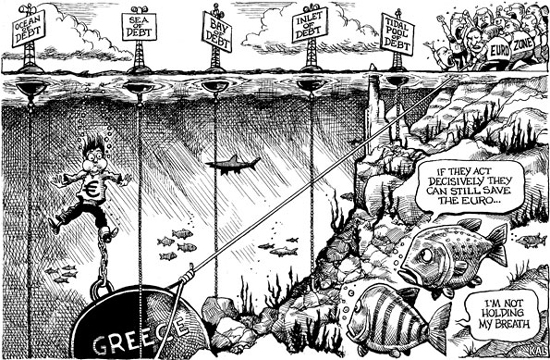
2. Is negative news always true, positive news always false?
Or, Is it time to cheer up? Just a little? Reject the depressingly negative among us? Look at the data without a doom-filter? Anatole Kaletsky of Reuters thinks it is.
In terms of objective economic and financial conditions, the end of this year looks like a turning point in the slow recovery from the global financial crisis. Outside the euro zone, which now accounts for just 17 percent of global output and will shrink to just 9 percent by 2060 according to the OECD, economic statistics are clearly improving.
Unemployment, though still high, is steadily falling. Banks are now adequately capitalized. Property prices have stabilized, stock markets are rising and credit conditions have returned more or less to normal. For much of this year, the main obstacle to hiring and investment decisions, according to many business surveys, has been uncertainty about politics and monetary policy. That uncertainty is almost over. This may sound preposterous. After all, businesses and financiers have been obsessed all year with the euro crisis or speculation about Fed monetary policy or the U.S. presidential election or China’s surprisingly chaotic leadership transition — and now the prospect that the United States will fall off a fiscal cliff, dragging down the whole world economy.
But that is the point. Political uncertainties have been resolved or dramatically improved in all the most important economies.
Yet business sentiment is so negative that almost nobody believes this. Consider what is happening around the world - with the glaring exception of the Middle East, where war and political chaos is unfortunately quite normal. China has belatedly anointed its new leadership, which should end the paralysis in economic policy and ensure that the country’s gradual adjustment to a slower growth does not deteriorate into an economic collapse. In Europe, the crisis has certainly not ended, but German Chancellor Angela Merkel’s decision to back unlimited ECB bailouts and to keep Greece within the euro, essentially guarantees that the euro will not disintegrate, nor the banking system suffer a Lehman-style meltdown. At least until next October’s German elections.
Best of all, the uncertainty about U.S. politics and monetary policy, which have preoccupied businesses and investors this year to the exclusion of almost all other issues, is about to disappear.
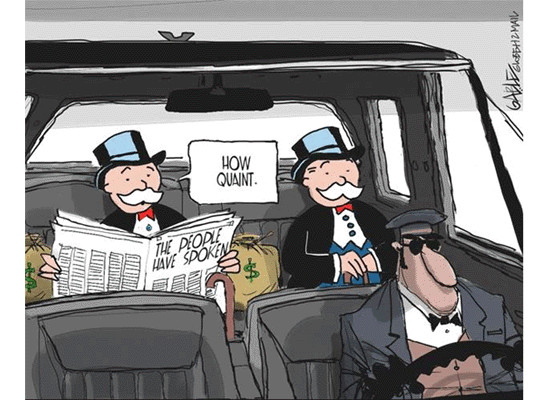
3. Shrinking fast
Jed Graham at Investors Business Daily gives us a fact you don't hear much about from Washington's chorus of deficit scolds, the US deficit is already going down at a very fast pace - the fastest rate since World War II demobilization.
Believe it or not, the federal deficit has fallen faster over the past three years than it has in any such stretch since demobilization from World War II. In fact, outside of that post-WWII era, the only time the deficit has fallen faster was when the economy relapsed in 1937, turning the Great Depression into a decade-long affair.
If US history offers any guide, we are already testing the speed limits of a fiscal consolidation that doesn't risk backfiring. That's why the best way to address the fiscal cliff likely is to postpone it. While long-term deficit reduction is important and deficits remain very large by historical standards, the reality is that the government already has its foot on the brakes.
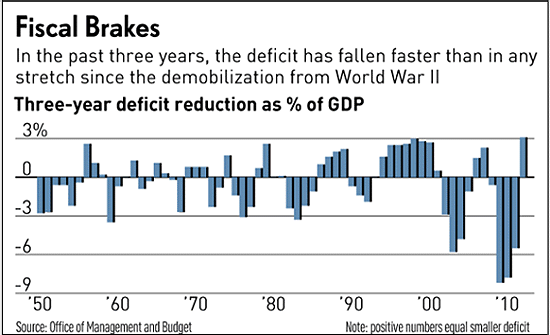
4. 'Stop obsessing about the deficit'
When I was doing my MBA in the US, Robert Reich's writings were assigned reading. Later, his The Work of Nations got him the job of heading Jummy Carter's Labor Department. He is unusually physically small (he has Fairbanks disease), is very smart indeed, and wields big influence. He worries more about growth than deficits. Here is an extract from a CSMonitor piece he wrote last week:
I wish President Obama and the Democrats would explain to the nation that the federal budget deficit isn’t the nation’s major economic problem and deficit reduction shouldn’t be our major goal. Our problem is lack of good jobs and sufficient growth, and our goal must be to revive both.
With more jobs and faster growth, the deficit will shrink as a proportion of the overall economy. Recall the 1990s when the Clinton administration balanced the budget ahead of the schedule it had set with Congress because of faster job growth than anyone expected - bringing in more tax revenues than anyone had forecast. Europe offers the same lesson in reverse: Their deficits are ballooning because their austerity policies have caused their economies to sink.
The best way to generate jobs and growth is for the government to spend more, not less. And for taxes to stay low – or become even lower – on the middle class.
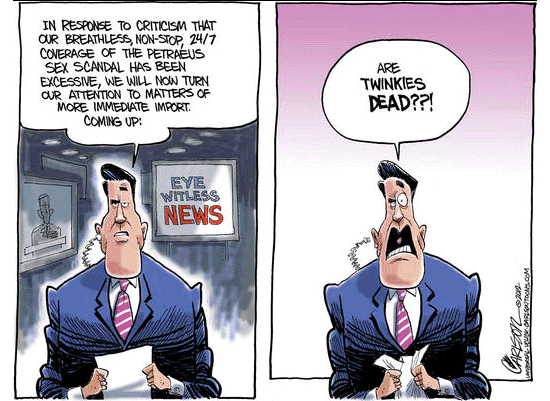
5. Using gold nanoparticles and light to produce hydrogen - future fuel?
In a rather remarkable achievement, researchers at Stony Brook University and the Brookhaven National Lab in New York are producing hydrogen from water using light and novel nanomaterials based on gold. The researcher says his project is first ever demonstration of the potential of using metal nanoparticles to make fuel from water.
Using nanotechnology, Professor Orlov’s group found that when the size of metal particles are reduced to dimensions below one nanometer, there is a tremendous increase in the ability of these particles to facilitate hydrogen production from water using solar light. “This is the first ever demonstration of the remarkable potential of very small metal nanoparticles [containing fewer than a dozen atoms] for making fuel from water,” said Professor Orlov.
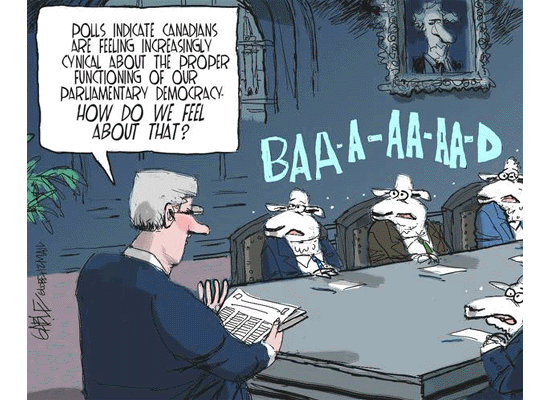
6. Bureaucrats with a plan
"Financial repression" is turning out to be the main way governments plan to escape the clutches of the debt-induced trauma they are suffering. Pity the savers. At least in New Zealand basic returns on savings are higher than the inflation rate. (Cue whiners who think otherwise, but you are wrong, at least at this time.) The problem is that a growing body of expertise is building on how to extend the 'repression'. I think that is one reason equity markets are taking off even in New Zealand. For the first time in a while, good dividend yields plus rising share prices make public company shares look attractive to first-time investors.
But New Zealand faces sophisticated 'repression' risk if what we see in other countries is any guide. What do you think the risk is of NZFirst or the Greens pressing for KiwiSaver or the Cullen Fund to invest more in NZ infrastructure? That is how 'financial repression' is more likely to come here. Here's how it is working out in Europe.
Many countries, including France, Ireland, and Portugal, governments have raided pension funds in order to finance their budget deficits. The UK is poised to take similar action, “allowing” local government pension funds to invest in infrastructure projects.
Direct or indirect monetary financing of budget deficits used to rank among the gravest sins that a central bank could commit. QE and OMT are simply new incarnations of this old transgression. Such central-bank policies, together with Basel III, mean that financial repression will likely define the economic landscape for at least another decade.

7. QE a 'time bomb'
Economist Stephen Roach worries that the US Fed's approach to stimulating their economy will lead to another bubble. Roach also discussed with former FDIC Chair Sheila Bair and other panelists at Rand Corporation's Politics Aside conference in Santa Monica, Calif., whether the government will resolve the fiscal cliff. Roach is a former non-executive chairman of Morgan Stanley Asia; senior fellow at the Jackson Institute for Global Affairs at Yale University.
8. Laboring with the truth
I have been following Julia Gillard's "union slush fund" troubles as reported by the AFR mainly because I had a run-in with both Slater & Gordon, and the AWU (minor ones) in a previous life. Neither seemed to me to be high in ethics. But what seemed at first to be a relatively minor issue has now assumed bigger proportions given the Victorian Police have launched an investigation. After surviving Tony Abbott, Julia G may be about to trip over her past.
Victorian police have confirmed the fraud and extortion squad is assessing a file that relates to the alleged misappropriation of funds from a union. In a statement, Victoria Police said they were not in a position to confirm who may or may not be involved in particular investigations, or who provided statements to police.
The confirmation comes as a former union official is expected to tell police on Friday about his involvement in a slush fund scandal being linked to Prime Minister Julia Gillard. Former Australian Workers Union (AWU) official Ralph Blewitt said he would meet Victorian fraud squad detectives at 10am (AEDT) and give a detailed account of misappropriated funds.
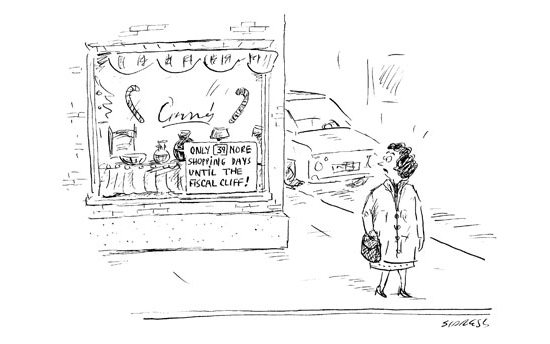
9. Calculated risk
Follow the data is the big message from Bill McBride. He is a blogger who has been hugely influential for those of us who follow the wierd world of economic trends. BusinessInsider has done a profile. HT Dan Bell.
The economics blogosphere was invented in early 2005 by a retired technology executive in Southern California named Bill McBride. Thank God for that, because his blog, Calculated Risk, has been an invaluable and influential read for numerous reasons. For one thing, it's always been right.
In its early days, when we all started reading it, it was way ahead of the curve in terms of warning about the housing bubble, horrible bank lending practices, and generally the economic collapse. From his perch in Newport Beach, CA he could see first hand the people taking out loans worth 10x their income, filling their Inland Empire garages with Harleys and Boats that they obviously couldn't afford.
But unlike many other bloggers who made a name during the crisis, he didn't stick with the doom and gloom message. He started making arguments for a GDP rebound in 2009. Then in February of this year, he made his most important call: He announced: The Housing Bottom Is Here. McBride had officially come full circle from his days warning of housing collapse. Today, 8 months later, the housing bottom is becoming general consensus.

10. Another reason why NZ is way better
I'm very lucky indeed, compared to this English guy.

19 Comments
Checkout recent NYTimes for interesting analysis of Nats strategy::
November 23, 2012 - By MICHAEL CIEPLY and BROOKS BARNES - Business Day / Media & Advertising - Article - Print Headline: "New Zealand Wants a Hollywood Put on Its Map"re 10
To me, the complains about his children are more of a reflection on this own parenting than that of his children.
Having taught thousands of children from both rich and poor families and witnessed a steady erosion of community standards and family interaction over a period of 37 years, coupled with a growing sense of entitlement fuelled by money borrowing politicians anxious for re-election, I have a degree of sympathy for this guy.
A friend emailed this to me today, the stats are for the US
- Entitlements as percentage of federal spending: 16% (2011); 9% (1991)
- U.S. households receiving federal assistance: 107 million (2011); 41 million (1991)
- Individuals on food stamps: 45 million (2011); 23 million (1991)
- Individuals on disability insurance: 8.8 million (2012); 3.4 million (1992)
Argentina and America – of Vulture funds and Justice
http://www.golemxiv.co.uk/2012/11/argentina-and-america-of-vulture-fund…
"in New Zealand basic returns on savings are higher than the inflation rate. (Cue whiners who think otherwise, but you are wrong, at least at this time.)"
Right...so objecting to the above claim invites being branded a 'whiner'....now I do partake of the odd bottle of wine but calling me a 'whiner' is a tad too far.
Oh and inflation....it is what it is reported to be and not what it is seen to be....
To save or not to save..that is the question...in a sea of cheap debt engineered to create the idea that all is well in the sea of debt....just make sure you are out of the water when the plug is pulled.
in New Zealand basic returns on savings are higher than the inflation rate. (Cue whiners who think otherwise, but you are wrong, at least at this time.)
Which inflation rate is being referred to?
And how has it been determined?
And does anyone still believe that the so-called inflation rate holds any reference to reality?
PS. Nice way to get your ad hominem attack in early. I don't mind being labelled a whiner. Rather be labelled a whiner that be put off from calling BS.
Why would you exclude it when that is the most important item (shelter) on the list.
Well if you belonged to a certain political class that had on average 2.x properties to your name... Why wouldn't you???
re: #2 - Which fantasy land is that reporter living in? It's not about doom or gloom it's all about the extreme levels of debt throughout the world. I notice that she never mentioned anything about the Japanese situation, which Kyle Bass suggests is a bug looking for a windshield. As Hemingway wrote bankruptcy happens "gradually and then suddenly".
actually, "she" is a guy who works for Reuters. More details here » http://en.wikipedia.org/wiki/Anatole_Kaletsky
This is his profile:
Anatole Kaletsky is an award-winning journalist and financial economist who has written since 1976 for The Economist, the Financial Times and The Times of London before joining Reuters. His recent book, "Capitalism 4.0," about the reinvention of global capitalism after the 2008 crisis, was nominated for the BBC’s Samuel Johnson Prize, and has been translated into Chinese, Korean, German and Portuguese. Anatole is also chief economist of GaveKal Dragonomics, a Hong Kong-based group that provides investment analysis to 800 investment institutions around the world.
I used to read Kaletsky when he wrote for the Times. In the lead up to the GFC he constantly denied there was any issue with the housing market (either in the UK or the US), he thought Gordon Brown was a wonderful Chancellor of the Exchequer and believed that the early 2000's represented a new paradigm for unlimited economic global growth.
The man is a buffoon. He became a laughing stock on the UK economic blogoshere and it is disheartening to see someone who was so spectacularly wrong being given a platform.
For many ppl the business as normal paradygm has to be able to continue for ever...
Its kind of interesting when you point out the fundimental maths, (the infinite does not divide into the finite)....and still its denied or ignored.
regards
re: #3 - Yet the U.S. debt clock is still accelerating. Don't let reality get in the way of a faux "good news" story.
A balanced top ten there David - the good the bad and the ugly you might say.
But that Robert "deficits don't matter" Reich's peice really is a load of nonsense. Just ask the Greeks or the Irish or the Argentinians etc. etc. It's pretty simple really, they can't go on a spending spree with borrowed money - no one will lend to them. Sorry Krugman & co. there's no free lunch and Santa and the tooth fairy are all just made up as well. Also see the Stephen Roach peice #7 re QE.
I think things will become crystal clear when Japan runs into Big Bond Trouble next year, they really have no option but ever increasing QE now. All that money "invested" by Japanese pension funds is headed to money heaven and when she blows up it will shake that country to the core.
I linked to it previously and Andy mentions it above but Kyle Bass's newsletter, largely on these very issues, is an absolute must read.
http://www.scribd.com/fullscreen/113621307?access_key=key-11v6eigpyerwn…
Well in terms of "just made up" I think that looks more like your and KB's economics outlook, badly flawed.
There are some differences in the above instances...and the devil as they say is in the detail.
and BTW Paul Krugman doesnt say its a free lunch, what he says is the present debt is less of an issue than continuing high un-employment and a lack-luster economy, plus the risk of triggering a depression...
So his short term outlook is get the economy back on its feet, un-employment down and then address the problems. Doing it in the reverse order will incraese un-employment, increase un-employment payouts, decrease Govn income and send us into a Mega Depression....
Now I'll admit with Peak oil effects Im not sure we can recover.....as such....but at least there is on the one hand a sound (keynesian) economics model v voodoo this is how I want it to be economics model on the other to deal with a zero bound trap.....yes neither allow for energy scarcity...
regards
I think the real heading for #5 ended up with #8. There have been the equivalent of two Olympic swimming-pool-fulls of gold extracted, globally, ever. Being at or about peak gold, we can assume two more, but gotten with increasing difficulty, using more and more energy to do so, under conditions of increasing competition.
How many tanks of hydrogen - a vector, not a source - will that do again?
Ah well, we've had our Lomborg Laugh,
note #2 doesn't adress the real world. All about economics and emotion. Go figure.
The era of austerity could last until 2018 and VAT may have to rise to as high as 25 per cent to help plug the hole in the public finances
http://www.dailymail.co.uk/news/article-2238403/Austerity-2018-VAT-hit-25--Thats-cut-deficit-experts-tell-Osborne.html#ixzz2DI5rF2UQ
2018...optimistic chap!
Read and realise but for some fluke market matters and the chch rip snorter, we too would be in this poo
So raise VAT....the poor are already being hammered left right and centre meanwhile the rich buying ever bigger houses and more expensive cars.
regards
Remember when QE first started and all the talk of hyper-inflation. Well i said back then that it would not happen, essentially because there are two sides to supply and demand and everyone was only focusing on the demand side.
Imagine that when economies come right then all this money swishing about will cause inflation. BUT, countries, all over the world, are desperate for growth to pay off their debts. So businesses, all over the world, crank up production to 100%. Now we have supply catching up with demand to put the brakes on inflation.
The big winner being the sharemarket as it breaks all records, particularly mining and scarce recources.
Now isn't that an alternative to hyper-inflation?
Not everyone...keynesians like Paul Krugman have been saying for 4 / 5 years that the danger was deflation and not [hyper]-inflation...
One of the classic definations about inflation is of course that there is more money than goods to buy, hence goods prices rise. Yet we see everytwhere that there is luckluster demand....and significant over-capacity, and under-employment.
So really until the over-capacity is removed and there is an marked improvment in un-employment, inflation isnt the issue.
Now sure we'll see some areas like up-market housing being silly. That is quite explainable, the rich are getting better off every day so the things they buy are inflating. Meanwhile in the real world where 95% of us live, overall the price change is +0.9%. That means with 6% rates increases some other areas are having to take losses.
Lots of things can explian the dead cat bounce of the share market, the best Ive seen is its a Fed fed Ponzi scheme...they pump in cheap money and the banksters gamble with it.
Of course all ponzi schemes collapse....and very fast.
The thing about mines and scarece resources is it strikes me that the specualtiors buying have not cottoned on to the fact that there is a price ceiling....ie a price beyond which ppl cannot pay. So for me 2 things will eventually happen....the speculators will finally realise and get out and then the mines will close....
regards

We welcome your comments below. If you are not already registered, please register to comment
Remember we welcome robust, respectful and insightful debate. We don't welcome abusive or defamatory comments and will de-register those repeatedly making such comments. Our current comment policy is here.